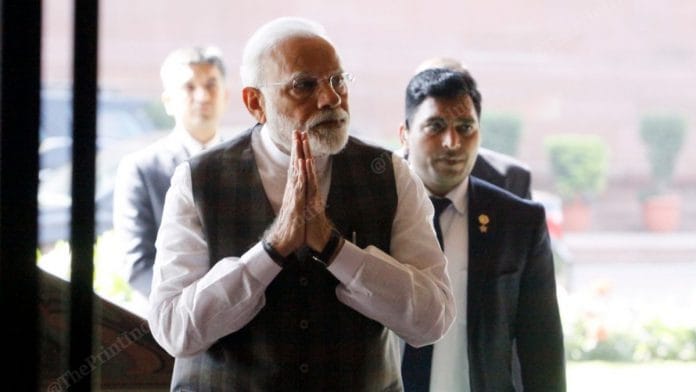New Delhi: For many in India, the gravity of the Covid-19 pandemic seemed to hit home only after Prime Minister Narendra Modi appealed to people to shun Holi celebrations in early March, which was followed by his announcement of a ‘Janata Curfew’ on 19 March.
An analysis of the central government’s Covid communication by the University of Cambridge has found that these “nudges” by PM Modi had played a pivotal role to influence people into taking “Covid appropriate behaviour”.
The analysis was published in the journal PLOS ONE on 11 September.
“Prime Minister’s Office (PMO) was at the forefront of the fight against coronavirus… Prime Minister Narendra Modi’s nudges were driving the Covid preparedness, action and mitigation strategies in the country. His frequent public appearance was the most significant factor that created nudges in keeping a country of 1.3 billion (130 crore) people under strict lockdown and social distancing measures,” wrote two researchers from the Behaviour and Building Performance Group, Department of Architecture in Cambridge.
“In this process, the PMO spearheaded the creation of ‘Prime Minister’s Citizen Assistance and Relief in Emergency Situations Fund’ (PM CARES Fund) for dealing with emergency or distress situations like (those) posed by Covid-19 pandemic,” they added.
The researchers said PM-CARES was created to nudge the public into “micro-donations and show the strength of public participation to mitigate any issue”.
“Most of the nudges were in the form of social media advertisements, SMS forwards and repeated reminders through broadcasting media.”
The researchers looked at all the statements and communication issued by the Press Information Bureau (PIB), the arm of the government that is in charge of information, education and communication on various government programmes.
As part of the study, the researchers created a text corpus of 2,60,852 words from 396 PIB documents. An unsupervised machine-based topic modelling using Latent Dirichlet Allocation algorithm was performed on the text corpus to extract the high probability topics.
Also read: Modi’s Covid-19 lockdown speech shows he doesn’t learn from past mistakes, or doesn’t care to
‘Created herd effect through nudge of nationalism’
India had the harshest lockdown in the world, according to a stringency index created by the University of Oxford.
The present Cambridge analysis highlighted the pivotal role Modi played in the enforcement of the lockdown — which was initially announced for 21 days, but eventually ended after 68 days.
“India locked down 1.3 billion people on March 25, 2020, in the wake of novel coronavirus pandemic. The Prime Minister of the country, Mr Narendra Modi, in his address to the nation on 24th March 2020, appealed to the nation that ‘… 21 days is critical to breaking the infection cycle… or else the country and your family could be set back 21 years…’. In a sense, the government used the nudge of ‘nationalism’ as an effective measure to control the disease spread.”
“This nudge had critical public policy implications because it successfully convinced 1.3 billion people to abide by lockdown rules at high economic and social costs. The economic cost of the Phase 1 lockdown of 21 days (March 25 to April 14, 2020) was estimated to be almost USD 98 billion,” according to the article.
The study looked at the specific roles played by all the ministries, and also outlined the fact that the significant policy nudges were on the use of Aarogya Setu (the Covid-19 contact tracing app), on compliance of quarantine rules and use of smart surveillance technologies such as GIS-based methods for monitoring quarantined patients in municipality areas.
“… the populist Prime Minister frequently nudged the nation on staying at home, adhering to lockdown rules, improving immunity through yoga and Ayurveda and contributing to the PM-CARES fund. A herd effect was created through such nudges where public participation and micro-donations led the fight against Covid-19.”
“Similar nudges for micro-donations through herd effect were also seen in other critical sectors like the manufacturing, commerce, power, construction and pharma,” the article stated.
Also read: Narendra Modi is selling a failed Covid lockdown as a success







How nice, the white man validates PM Modi’s able leadership. Glad you told us heathen that we have a good leader.